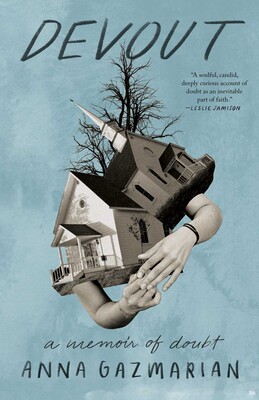Healing Spiritual Trauma Through Writing: 5 Questions for Anna Gazmarian
By Craig Morgan Teicher
Anna Gazmarian (MFA, ’20, Nonfiction) began work on what would become her debut, Devout: A Memoir of Doubt (Simone & Schuster, 2024), while she was a nonfiction student in the Bennington Writing Seminars. The book chronicles her struggles with bipolar disorder as a member of the Evangelical community, where prayer was posited as the only solution to mental health distress. I talked to Anna on the heels of her book tour. Among other things, we discuss writing, publishing, and going to church at the gym.
You began working on this material as a student. What were the next steps with the manuscript after you graduated?

After Bennington, I worked with an editor through the Queens University Book Development graduate certificate program. Following that, I was rejected by a bunch of editors who told me that my book, which explores religion but is written for a literary audience, was not marketable. I emailed an editor, Yahdon Israel of Simone & Schuster, who had posted that he was accepting manuscripts without representation. He ended up wanting to publish my book, so I then had to get an agent. Yes, it was a miracle. But it was a long, long journey to get there. Never take no for an answer. You have to be stubborn and really believe in your book—keep going.
You’ve just been on book tour. What kinds of people have been showing up at your readings?
It’s funny how often I meet people on tour and immediately feel connected to them. We speak the same language. I’ve met a lot of people who underwent similar experiences with mental illness and religious trauma. During signings, I usually end up in tears with people telling me their stories. It’s an honor and humbling experience for people to feel safe with me. That’s what I wanted my book to be—a place of safety for people.
Has the adventure of writing the book changed your relationship to faith?
Very much so. The book made me realize the extent of healing that I have to do in relation to spiritual trauma. It has also made me realize that I’ve spent much of my spiritual journey relying on faith leaders to tell me what it means to live a life of faith. It’s the same with psychiatry, looking to doctors to tell me how to be stable. I’ve learned to become my own advocate in my own way. Evangelicalism resists being able to trust your own intuition and agency. That’s something that I’m hoping to reclaim. I’ve sought to create a faith on my own terms, redefining meaning. I find God in nature, in people, in the most mundane moments. Maybe one day I will return to church, but for now, I find places like the gym are like my church. It’s a group of people different from me who are working together and accepting how different our lives are. That embrace is what I want in a religious setting. Also, after having my daughter, I think a lot about what it means to raise a child in religion. I think about the difference between indoctrination and free will. Thinking about how I want to teach her about God has been healing for me—as a place of safety and love, not fear.
What's next?
I’m working on more of a narrative coming-of-age memoir about growing up evangelical. I’m loving the research process. I want to continue exploring the mindset of evangelicals, providing a level of empathy and nuance while redefining healthy ways to practice faith.
Are there a couple of pieces of wisdom that you can share with other writers longing to publish a book?
I think the biggest thing is to really savor where you are in the writing process, not rush through it because you will learn more in each step. I regret how much time I spent looking to the next step, thinking that it would somehow eliminate my self doubt and make me more fulfilled. None of that happened. There’s a part of me that really misses the editing process because it was an intimate and spiritual one for me.
I also remember getting crushed by rejection. Working at a literary magazine changed my perspective because I saw how subjective the entire process is. A lot of the time, it boils down to one person’s opinion. I saw how frequently amazing pieces were rejected while several editors wanted them to be published. Being published does not make your work more valuable or meaningful. It’s important to really trust what you want to do, what you want to accomplish, and not be weighed down by what others want your work to be.
It’s also never worth sacrificing your health for your writing. It is possible to be healthy and also to write. Figure out what that looks like for you. Being a tortured artist doesn’t improve your work.